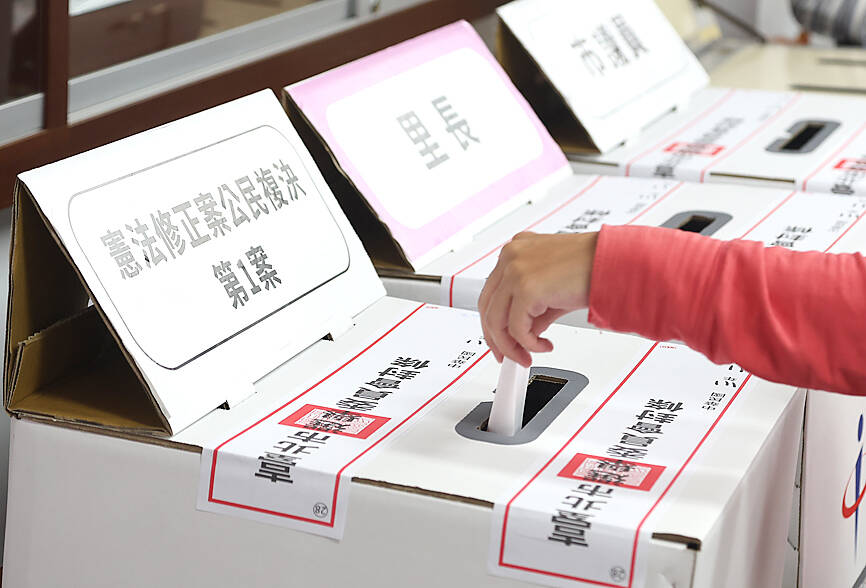A proposed constitutional amendment to lower the voting age to 18 from 20 did not pass yesterday after it failed to garner the minimum number of votes required.
The referendum, which asked voters if they agree to amend the Additional Articles of the Constitution to grant Taiwanese aged 18 years or older the right to vote and the right to run for public office, was held concurrently with local government elections.
The referendum needed 9,619,697 “yes” votes, or half the number of eligible voters, to pass.

Photo: CNA
The Central Election Commission data showed that 5,647,102 voted “yes,” while 5,016,427voted against the proposal.
To amend the Constitution, a draft amendment must first pass the legislature with three-quarters of legislators present and three-quarters of those present voting for it. The amendment must then be endorsed in a national referendum.
The 113-seat legislature on March 25 voted 109-0 in favor of lowering the voting age, sending a message of cross-party support for the measure and sending it to a national referendum.
A plebiscite on a proposed constitutional amendment is different from referendums seeking to change a government policy or law.
The election commission has said that referendums on constitutional amendments are not subject to the Referendum Act (公民投票法), which allows citizens aged 18 or older to vote and prohibits holding referendums on the same day as national elections.
The commission also cited the Constitution as saying that only citizens aged 20 or older are eligible to vote in referendums on constitutional amendments.
In addition, referendums on constitutional amendments requires twice the number of “yes” votes to pass, while other referendums only require 25 percent of eligible votes to cast a ballot and a majority to support the proposed policy or law.
This story has been updated since it was first published.

A magnitude 5.6 earthquake struck off the coast of Yilan County at 12:37pm today, with clear shaking felt across much of northern Taiwan. There were no immediate reports of damage. The epicenter of the quake was 16.9km east-southeast of Yilan County Hall offshore at a depth of 66.8km, Central Weather Administration (CWA) data showed. The maximum intensity registered at a 4 in Yilan County’s Nanao Township (南澳) on Taiwan’s seven-tier scale. Other parts of Yilan, as well as certain areas of Hualien County, Taipei, New Taipei City, Taoyuan, Hsinchu County, Taichung and Miaoli County, recorded intensities of 3. Residents of Yilan County and Taipei received

Taiwan has secured another breakthrough in fruit exports, with jujubes, dragon fruit and lychees approved for shipment to the EU, the Ministry of Agriculture said yesterday. The Animal and Plant Health Inspection Agency on Thursday received formal notification of the approval from the EU, the ministry said, adding that the decision was expected to expand Taiwanese fruit producers’ access to high-end European markets. Taiwan exported 126 tonnes of lychees last year, valued at US$1.48 million, with Japan accounting for 102 tonnes. Other export destinations included New Zealand, Hong Kong, the US and Australia, ministry data showed. Jujube exports totaled 103 tonnes, valued at

TRUST: The KMT said it respected the US’ timing and considerations, and hoped it would continue to honor its commitments to helping Taiwan bolster its defenses and deterrence US President Donald Trump is delaying a multibillion-dollar arms sale to Taiwan to ensure his visit to Beijing is successful, a New York Times report said. The weapons sales package has stalled in the US Department of State, the report said, citing US officials it did not identify. The White House has told agencies not to push forward ahead of Trump’s meeting with Chinese President Xi Jinping (習近平), it said. The two last month held a phone call to discuss trade and geopolitical flashpoints ahead of the summit. Xi raised the Taiwan issue and urged the US to handle arms sales to

BIG SPENDERS: Foreign investors bought the most Taiwan equities since 2005, signaling confidence that an AI boom would continue to benefit chipmakers Taiwan Semiconductor Manufacturing Co’s (TSMC, 台積電) market capitalization swelled to US$2 trillion for the first time following a 4.25 percent rally in its American depositary receipts (ADR) overnight, putting the world’s biggest contract chipmaker sixth on the list of the world’s biggest companies by market capitalization, just behind Amazon.com Inc. The site CompaniesMarketcap.com ranked TSMC ahead of Saudi Aramco and Meta Platforms Inc. The Taiwanese company’s ADRs on Tuesday surged to US$385.75 on the New York Stock Exchange, as strong demand for artificial intelligence (AI) applications led to chip supply constraints and boost revenue growth to record-breaking levels. Each TSMC ADR represents